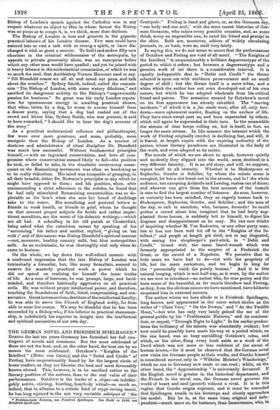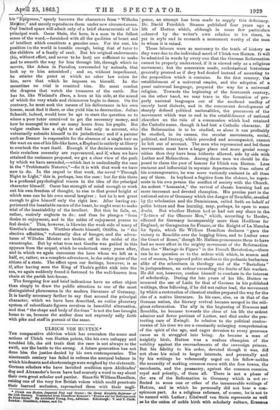THE GERMAN NOVEL AND FRIEDRICH SPIELHAGEN.* DURING the last ten
years Germany has furnished her full con- tingent of novels and romances. But the most celebrated of these are not the best, and, on the other band, the best are by no means the most celebrated. Gutzkow's "Knights of the intellect" (Ritter corn Geiste), and the "Debit and Credit" of Freitag, have unquestionably found by far the largest circle of home readers, as they are likewise the best and most favourably known abroad. This, however, is to be ascribed rather to the literary position of the authors, than to the real value of their performances. Gutzkow is the leader of a clique—an indefati- gably active, stirring, bustling, busybody withal—so much so, indeed, that in allusion to a certain kind of crypt-loving insect, he has long rejoiced in the not very enviable sobriquet of 1 the • Problerhotische Yaturen, von Friedrich Spielhagen. Yon Nacht rir Licht, von Friedrich Bpicilogen. Centipede." Freitag is hand and glove, or, as the Germans y, "one body and one soul," with the most recent historian of Ger- man literature, who seizes every .possible occasion, and, as some think, many an impossible one, to extol his friend and protégé to thc skies. Both are, moreover, editors of widely circulating journals, or, at least, were so, until very lately.
In saying this, we do not mean to assert that the performances of Gutzkow and Freitag are void of all merit. " The Knights of the Intellect" is unquestionably a brilliant daguerreotype of the period to which it refers ; but between a daguerreotype and a genuine work of art there is a considerable interval. It is equally indisputable that in "Debit and Credit" the theme selected is spun out with stubborn perseverance and no small degree of skill ; but the theme itself is a mere whim, and a whim which the author has not even developed out of his own nature, but which he has adopted wholesale from his critical friend and patron. The sensation created by Gutzkow's novel on its first appearance has already subsided. The "moving incidents" of which it is a fee simile were, after all, only inci- dents—mere ephemeral matter, floating on the surface of life. They have since swept past us, and been superseded by others, which will again be superseded in their turn. In the meanwhile the stream of time keeps rolling on, but is itself, in fact, no longer the same stream. In like.manner, the interest which the work of Freitag originally excited is declining fast, and will, it is feared, at length expire with the expiring authority of the patron, whose literary paradoxes are illustrated in the body of the work, and even adopted as its motto.
The novels of which we are about to speak, however quietly and modestly they slipped into the world, seem destined to a very different futurity. It is an old story, and will, we suppose, repeat itself to all eternity. Whether it be Shakespeare or Sophocles, Goethe or Schiller, by whom the mimic scene is occupied, let but a riot break out in the streets, and lo ! the whole audience, not excepting Aristotle and Lessing, rushes out of doors; and whoever can give them the best account of the tumult is sure to find the largest number of listeners. As soon, however, as curiosity has been satisfied, they as eagerly hasten back to Shakespeare, Sophocles, Goethe, and Schiller ; and the man of the day, so rich in anecdote, who, because, forsooth! he could gather a crowd about him, imagined that he had fairly sup- planted those heroes, is suddenly left to himself, to digest his disgrace and disappointment as he may. No one now thinks of inquiring whether M. Von Radowitz, or any other party man, has or has not been well hit off in the "Knights of the In- tellect;" and people at length get tired, not to say disgusted, with seeing the shopkeeper's yard-stick, in " Debit and Credit," bound with the same laurel-wreath which was formerly appropriated to the sceptre of a Frederick the Great, or the sword of a Napoleon. We perceive that in both eases we have had to do—not with the propriety of life, but its mere caricature, and we begin to long for the " perennially valid, the purely human." And it is this natural longing, which is met half-way, as it were, by the author we are now to introduce—an author who, for true poetry and the keen sense of the beautiful, as far excels Gutzkow and Freitag, as they, from the obvious causes we have mentioned, have hitherto surpassed him in external success.
The author whom we here allude to is Friedrich Spielhagen, long known and appreciated in the more select circles as the writer of" Clara Vere," " On the Downs," and "At the Twelfth Hour,"—but who has only very lately gained the ear of the general public by his "Problematic Natures," and its continua- tion, or sequel, "Through Night to Light." In his earlier produc- tions the brilliancy of his talents was abundantly evident; but how could he possibly have made his way at a period which, on the one hand, was so busy unriddling Gutzkow's rebus, and which, on the other, flung every book aside as a work of the Devil which was not more or less redolent of the sweat of human brows,—for it must be observed that the German novel now visits the German people at their works, and Goethe himself is considered correct only in "Wilhelm Meister's Wanderings," which no one in Germany now reads or can read ; while, on the other hand, the "Apprenticeship "is universally devoured. If the English novel is greater in the historical department, and the French in the social one, the German novel governs the world of heart and soul (gemitth) without a rival. It is in this region that Goethe reigns supreme, and it must be conceded that Spielhagen treads in his footsteps and closely approaches his model. But he is, at the same time, original and inde- pendent—much more so, for instance, than Immermann, who, in
his "ipigonen," openly borrows the characters from "Wilhelm Mei l
ter," and merely reproduces them under new circumstances. 0i limited space will admit only of a brief characteristic of his principal work. Oscar Stein, the hero, is a man in the fullest sense of the word,—furnished with all the qualities of heart and of intellect which constitute a genuine man. For the rest, his position in the world is bumble enough, being that of tutor to the children of a family of rank. But his original endowments (his, without effort, and never to be lost) are sufficient to make and to smooth the way for him through life, through which lie moves, like Adam in Paradise, surrounded by animals, that look up to him astonished ; and so, without impediment, he attains the point at which no other law exists for him, save that which he imposes on himself. In the meantime no trial is remitted him. He must combat the dragons that watch the treasures of the earth. Nor has he, like 'Wieland's Hum, a horn at his side, at the sound of which the very whale and rhinoceros begin to dance. On the contrary, he must seek the means of his deliverance in his own bosom, must find it there, or else yield him to destruction. Julian Schmidt, indeed, would here be apt to start the question as to where a poor tutor contrived to get the necessary money, and how he managed to steal so many hours from his pupils. But vulgar realism has a right to call him only to account, who voluntarily submits himself to its jurisdiction ; and if a painter such as Denner is responsible for the absence of a single hair on the wart on one of his life-like faces, a Raphael is entirely at liberty to overlook the wart itself. Enough if the decisive moments in their resistless necessity are represented, and if, when we have attained the eminence proposed, we get a clear view of the path by which we have ascended,—which last is undoubtedly the case in the "Problematic Natures,"—for it is with that work we have now to do. In the sequel to that work, the novel "Through Night to Light," this is, perhaps, less the case ; but for this there is a profound psychological reason in the idea of the principal character himself. Oscar has strength of mind enough to work out his own freedom of thought, to rise to that proud height at which man can be his own moral lawgiver ; but he is not great enough to give himself only the right law. After having ex- perienced the insatiable nature of the heart, he ought next to make trial of the insatiability of the intellect. But this he fails, or, rather, entirely neglects to do ; and thus he plunges "from desire to enjoyment, and in the midst of enjoyment yearns to feel desire." This, however, is likewise the weak side of many of Goethe's characters. Werther shoots himself; Ottillia, in "the elective affinities," voluntarily dies of hunger, and the adven- tures of Wilhelm Meister are broken off in the midst of the catastrophe. But by what true tact Goethe was guided in this appears from the sequel, which be undertook many years after, and in which we again encounter the hero whom we left as a half, or, rather, as a complete adventurer, in the sober guise of the citizen of a state. The effect upon our feelings, however, is as if, after having seen the King of Thule's goblet sink into the sea, we again suddenly found it fastened to the well-known iron chain at the parish hot-house.
The foregoing few and brief indications have no other object than simply to draw the public attention to one of the most distinguished phenomena in the modern literature of Germany. It is hardly necessary farther to say that around the principal character, which we have here described, an entire planetary system of subordinate figures revolves in beautiful alternation, and that "the shape and body of the time" is not the less brought home to us, because the author does not expressly sally forth with pike and staff in pursuit of the same.































 Previous page
Previous page